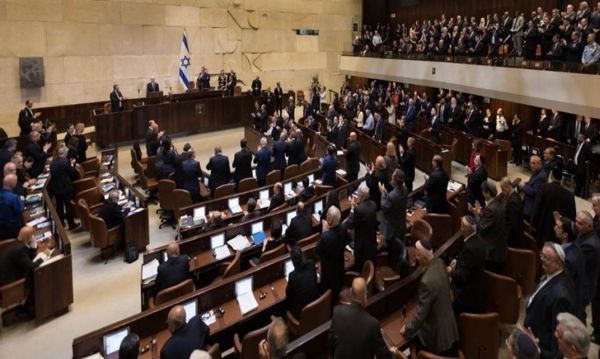To outsiders, Israeli democracy often seems chaotic, incomprehensible and hopelessly flawed. Plenty of other adjectives might apply as well. But when you tune out the tumult of the politicians, Israel’s democratic system is healthy — even surprisingly normal by Western standards.
Israel’s form of parliamentary democracy is based on the proportional representation system. It’s pretty straight forward: the number of seats a party gets in the 120-seat Knesset, Israel’s parliament, is proportional to the number of votes the party received in an election. So, if 50 percent of the votes were cast for your party, you’d get 60 seats, 25% means you’d get 30 seats, 10% would give you 12 seats. The minimum threshold a party must reach is 3.25% of the popular vote, which is four seats.
Elections are like in other democracies: by secret ballot and supervised by an all-party Central Elections Committee headed by a Supreme Court Justice (currently Justice Hanan Melcer). Polling stations are monitored and voters are checked under the watchful eyes of scrutineers from three different parties and supervisory staff from the CEC. Voter fraud is rare, elections are considered fair and the results accurate – although often confusing until a government is formed.
Historically, no political party in Israel has ever received more than 50% of the vote, meaning coalition governments consisting of several political parties are the norm. In recent elections the highest percentage for a party has been slightly above 30%. When the results of the election are made official, the leader of the largest party is generally tasked with forming a government and has several weeks to negotiate with other parties to form a coalition that would have a minimum majority in the Knesset of 61 seats.
Join the fight for Israel’s fair coverage in the news
Israeli Democracy Based on Proportional Representation
The proportional representation system is familiar to many Europeans who also use this system, but it is somewhat strange to members of the British Commonwealth who use the British parliamentary system that is based on dividing the country up into electoral districts — similar to American elections — and electing a legislator from each district, or “riding,” as the Canadians often call them.
The specific method of the Israeli system is based on the d’Hondt system, named for Belgian Victor d’Hondt who described his formula in 1878.
Dozens of countries use this method, but Israeli democracy added a twist: excess votes a party gets that are not sufficient for another seat in the Knesset can be given to another party in what’s called a “surplus vote agreement” (formally known as the Bader-Ofer method, named after MKs Yohanan Bader and Avraham Ofer who proposed the idea in the 1970s). Surplus vote deals are registered with the CEC before the elections and the public is made aware of them. Processing the surplus votes agreements is only done after all the votes are counted, adding extra drama to the tabulation process.
Related reading: How Do Israeli Elections Work?
All this makes Israel’s electoral system almost incomprehensible to Americans, whose presidential system happens to be the exception when it comes to forms of democracy. American elections are mandated constitutionally to occur every four years and the president is voted for separately. In parliamentary systems like Israel’s it is generally the leader of the largest political party who is prime minister.
(Israel’s president is the politically neutral figurative head of state, like the UK’s monarch Queen Elizabeth, representing the will of the people, but having no political power. Israeli presidents are chosen by the Knesset and serve a single seven-year term. That position is currently held by Reuven Rivlin.)

In Israel, as in most parliamentary democracies, legislators are elected for what is usually a four-year term. A key difference from the American and British systems is that even though the government can fall before its four years are up, the prime minister can form a new coalition government and ask the Knesset for a vote of confidence. The PM then “takes office” again and continues to serve out the four-year term without the need for an election. If that doesn’t happen, then the country heads to the polls.
Related reading: So Why Can’t the Palestinians Vote?
There are other circumstances where the Knesset would dissolve itself and send the country to elections:
- The Knesset voluntarily votes to dissolve itself.
- The Knesset fails to pass the national budget on time.
- If a government does not have the support of 61 of the 120 MKs, the prime minister — with the president’s permission — can dissolve the Knesset.
Citizens are active participants in Israeli democracy with voter turnout averaging 71.6% over the past ten national elections, while in contrast voter turnout for the past ten US presidential elections has averaged only 53.4%.
The System Works

While the September 2019 elections are Israel’s 22nd trip to the polls in 70 years, there have been 34 governments during that time. That extra dozen changes of governing at times could give an appearance of instability. The opposite is the case, however. While Knesset sessions rarely complete an entire four-year term, the current average life of a session is about 3.2 years, a very acceptable, relatively stable and healthy figure when compared to other democracies.
Over the years there have been complaints about proportional representation and the outward appearance of bedlam in the plenum. The renowned British leader, Winston Churchill, famously said of democracy:
‘Many forms of Government have been tried, and will be tried in this world of sin and woe. No one pretends that democracy is perfect or all-wise. Indeed it has been said that democracy is the worst form of Government except for all those other forms that have been tried from time to time.…’
Related reading:12 Things to Know About Israeli Elections and What Happens After
In the 1980s, Israel toyed with changes to the system and convened a broad-based Knesset committee to make proposals. By 1992, the most they could agree on for improving Israeli democracy was a change allowing for the direct election of the prime minister. This resulted in many voters casting a ballot for the leader of one party to be prime minister, but then voting for a different party. The result was an unworkable situation that was finally rescinded in 2001.

Former MK and political analyst Einat Wilf says Israel’s proportional representation system works just fine. Looking from the outside at the “Startup Nation” with its high standard of living tends to bear her out.
“The system of government in Israel has many drawbacks,” Wilf said in her book on the subject, It’s not the system, stupid, “but so does every other possible method.” She noted that when examining other electoral systems none of them are without flaws.
Wilf says the problem is not with the system, but rather with the politicians and pundits who “are seeking simple solutions to complex problems.” She dismissed doomsday scenarios for Israel’s future, pointing out that Israel has weathered many political upheavals.
From a European’s perspective, “Israel is a very normative parliamentary democracy,” Wilf said. “A single constituency, proportional representation and a single house of parliament.”
“All European countries have various forms of proportional representation and coalition governments. So, the question is not about the system. Americans in general don’t understand parliamentary systems so they always ask what’s going on and they never understand, but that’s not specific to Israel.”
Liked this article? Follow HonestReporting on Twitter, Facebook, Instagram and TikTok to see even more posts and videos debunking news bias and smears, as well as other content explaining what’s really going on in Israel and the region.
Images: Wilf via YouTube/Einat Wilf;
Before you comment on this article, please note our Comments Policy. Any comments deemed to be in breach of the policy will be removed at the editor’s discretion.


